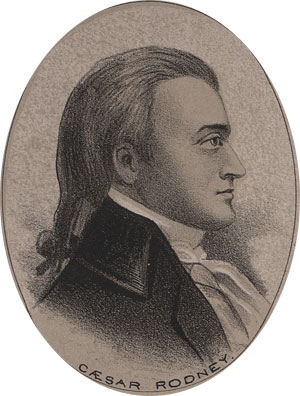Caesar Rodney
1728-1784
Representing Delaware at the Continental Congress

| Born: | October 7, 1728 |
| Birthplace: | Dover, Delaware |
| Education: | Informal (Judge) |
| Work: | Commissioned High Sheriff of Kent County, 1755; Elected to Colonial Assembly, 1758-70, 1771-76; Delegate to the Stamp Act Congress, 1765; Member of the Delaware Committee of Correspondence, 1765; Elected to Continental Congress, 1774-76, 77; Military Leader, 1774-77, Elected President of the State of Delaware, 1778-80; Member of the Upper House of the State Assembly, 1776-84; |
| Died: | June 29, 1784 |
Caesar Rodney was born on his father’s farm near Dover, Delaware, in October of 1728. He was tutored by his parents and may have attended a local Parson’s school, but received no formal education. His father died when Caesar was 17. He was placed in the guardianship of Nicholas Ridgely who was a clerk of the peace in Kent county, and this seems to be the root of Rodney’s life in politics. In 1755, under the royal government, Rodney was commissioned High Sheriff of Kent County Delaware. This was quite a distinction for a man twenty-two years of age and he apparently honored the distinction, for in succeeding years his official capacities grew to include registrar of wills, recorder of deeds, clerk of the orphan’s court, and justice of the peace. At age thirty he attained his first elected office as a representative in the colonial legislature at Newcastle. He served in that position, reelected each year except 1771, until the legislature was dissolved in 1776-and then resumed the seat as a representative to the Upper House of the State of Delaware until 1784.
Rodney was a leading patriot in his colony, a member of the Stamp Act Congress in 1765, a formative member of the Delaware Committee of Correspondence, a military leader in the colonial militia, and a delegate to the Continental Congress from formation until 1777. The following year he was elected President of the State of Delaware for a three year term, a duty that he assumed even as he served as Major-General of the Delaware Militia. In this office he played a crucial part not only in the defense of his own colony but in support of Washington’s Continental Army, for Delaware had a record of meeting or exceeding its quotas for troops and provisions throughout the revolutionary conflict. Rodney’s health and strength flagged for a time. He suffered from asthma and from a cancerous growth on his face, for which he never attained proper treatment. He saw his colony through the war at the cost of personal neglect.
In 1782 he was again elected to the national Congress, but was forced to decline the office due to failing health. He nonetheless continued to serve as Speaker to the Upper House of the Delaware Assembly. He died in that office, in June of 1784.








Recent Comments